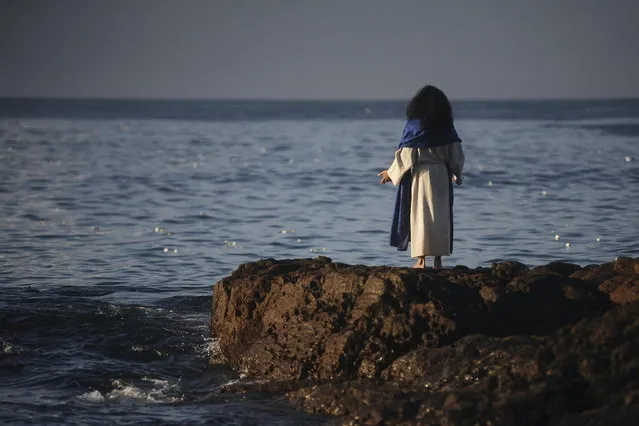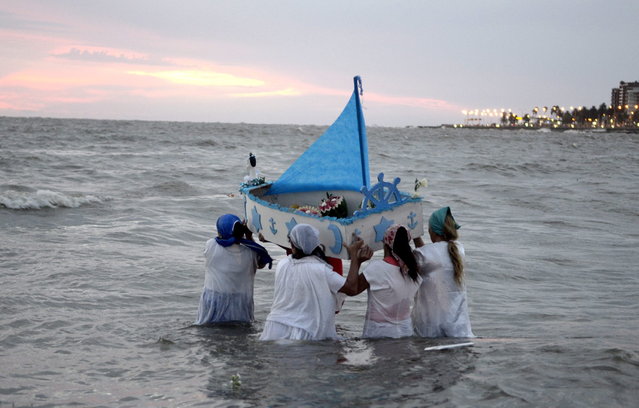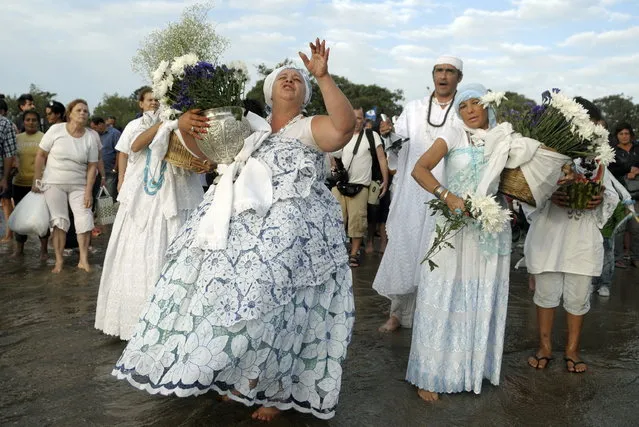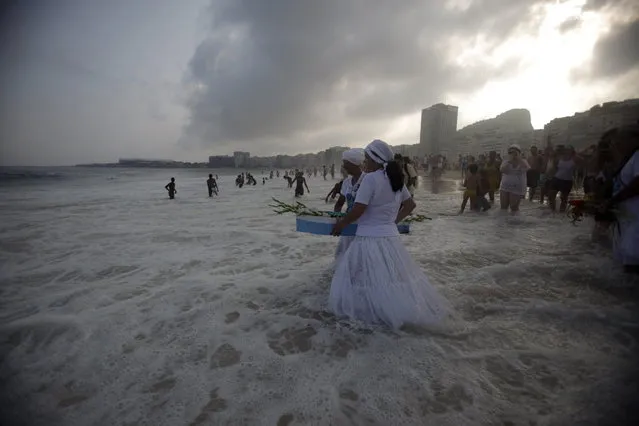“Yemanja is an orisha, originally of the Yoruba religion, who has become prominent in many Afro-American religions. Africans from what is now called Yorubaland brought Yemaya/Yemoja and a host of other deities/energy forces in nature with them when they were brought to the shores of the Americas as captives. She is the ocean, the essence of motherhood, and a protector of children.
Because the Afro-American religions were transmitted as part of a long oral tradition, there are many regional variations on the goddess's name. She is represented with lady of Regla and Stella Maris”. – Wikipedia
Because the Afro-American religions were transmitted as part of a long oral tradition, there are many regional variations on the goddess's name. She is represented with lady of Regla and Stella Maris”. – Wikipedia

A follower of the Afro-Brazilian religion Umbanda offers flowers as a tribute to Yemanja, goddess of the sea, in Rio Vermelho Beach in Salvador da Bahia, February 2, 2013. Devotees offer flowers to Yemanja, also known as the Queen of the Sea, before entering the water. (Photo by Lunae Parracho/Reuters)

Faithful carry a boat out to sea, filled with offerings to Yemanja, the African sea goddess, during a ceremony honoring the deity in Montevideo, Uruguay, Saturday, February 2, 2013. Thousands of worshippers come to the beach in Montevideo on her feast day, February 2, bearing candles, flowers, perfumes and fruit to show their gratitude for her blessings bestowed upon them. The belief in the goddess sprouts from Umbanda, a blend of religions that include African, Catholicism and Spiritism. (Photo by Matilde Campodonico/AP Photo)

Faithful prepare to wade into the ocean to deliver their offerings to Yemanja, the African sea goddess, during a ceremony honoring the deity in Montevideo, Uruguay, Saturday, February 2, 2013. Thousands of worshippers come to the beach in Montevideo on her feast day, February 2, bearing candles, flowers, perfumes and fruit to show their gratitude for her blessings bestowed upon them. The belief in the goddess sprouts from Umbanda, a blend of religions that include African, Catholicism and Spiritism. (Photo by Matilde Campodonico/AP Photo)

Simpatia e Quase Amor or “Kindness is almost love”, block party members and faithful carry a boat filled with flowers as an offering to the sea goddess,Yemanja, during a pre-Carnival celebration in Rio de Janeiro, Brazil, Saturday, February 2, 2013. Worshippers honor the deity, offering flowers and launching boats, large and small, into the ocean showing their gratitude for her blessings bestowed upon them. The belief in the goddess comes from the African Yoruban religion brought to America by West African slaves. (Photo by Silvia Izquierdo/AP Photo)

Followers of the Afro-Brazilian religion Umbanda pay tribute by offering flowers to Yemanja, goddess of the sea, in Rio Vermelho Beach in Salvador da Bahia, February 2, 2013. Devotees offer flowers to Yemanja before entering the water. (Photo by Lunae Parracho/Reuters)

Followers of Afro-Brazilian religion Umbanda carry flowers and offerings for Iemanja, goddess of the sea, in Copacabana Beach in Rio de Janeiro December 29, 2012. Every end of the year, worshippers present gifts to the sea goddess to give thanks for the year that is finishing and ask for blessings for the upcoming new year. (Photo by Ricardo Moraes/Reuters)

A woman prepares an offering for Yemanja, the African sea goddess, during a ceremony honoring the deity in Montevideo, Uruguay, Saturday, February 2, 2013. Thousands of worshippers come to the beach in Montevideo on her feast day, February 2, bearing candles, flowers, perfumes and and fruit to show their gratitude for her blessings bestowed upon them. The belief in the goddess sprouts from Umbanda, a blend of religions that include African, Catholicism and Spiritism. (Photo by Matilde Campodonico/AP Photo)
03 Feb 2013 13:14:00,
post received
0 comments
